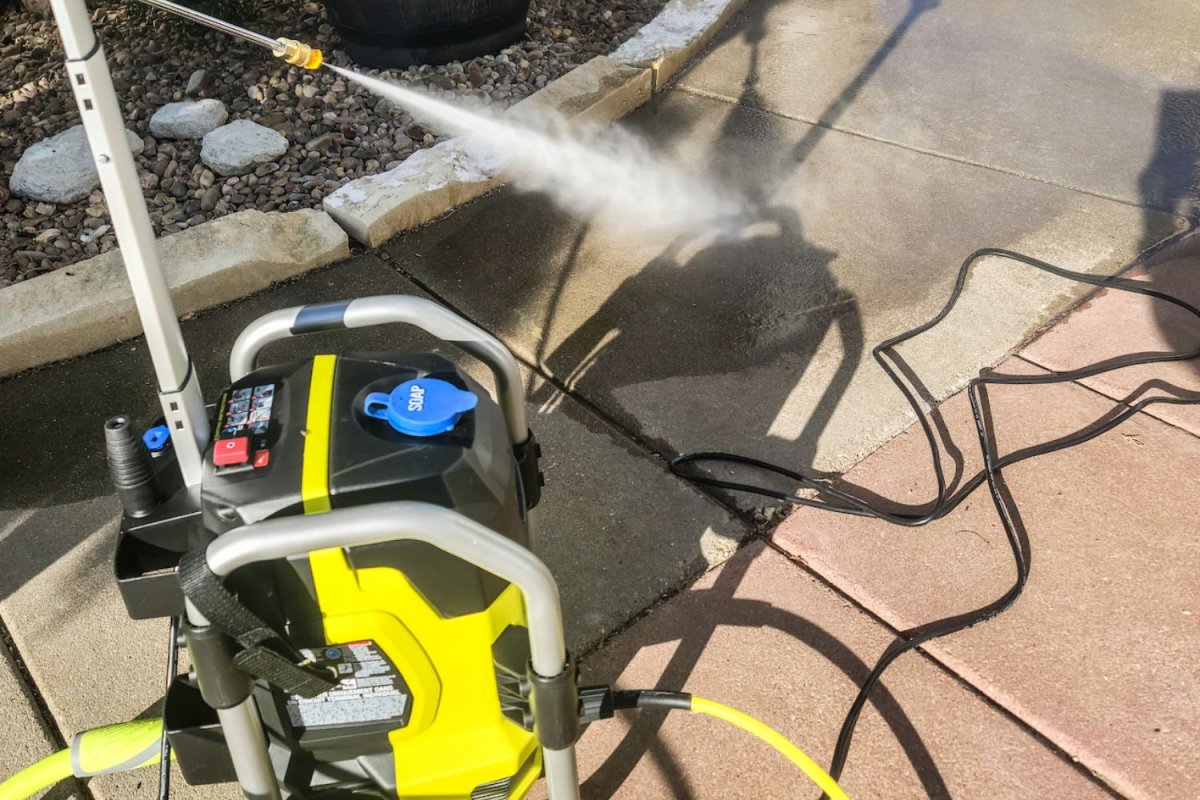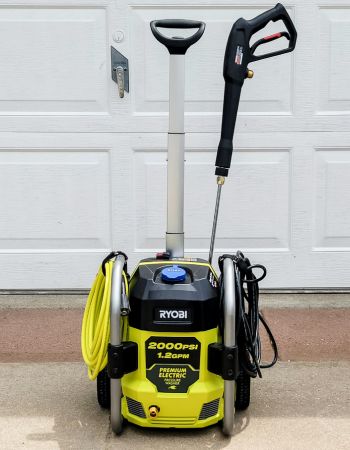

We may earn revenue from the products available on this page and participate in affiliate programs. Learn More ›
Nothing beats a good pressure washer for blasting dirt and mud from sidewalks, driveways, and dirty cars. I’ve used several gas-powered pressure washers in the past, all of which performed effectively but required regular maintenance and gasoline storage. In addition, I’m not too fond of gas fumes, which tend to give me a headache. I was excited to try out the Ryobi 2000 pressure washer but also a little skeptical.
The only electric pressure washerI’d used before this one delivered painfully weak water pressure—my garden hose with a jet nozzle performed just as well. However, the Ryobi 2000 surprised me by providing a lot more power than I expected. That was pretty impressive, but the tool isn’t perfect. Read on to find out what I liked about this compact power washerand what Ryobi could tweak to make it even better.
The Ryobi 2000 Pressure Washer: At a Glance
Rating: 8.75/10

PROS
- Pressure output of 2000 pounds per square inch (psi) makes for effective light-to-medium cleaning
- Comes with a 25-foot high-pressure hose for extended reach
- Extendable handle makes it easy to pull the pressure washer around
- Compact and lightweight design is easy to store in garage or shed
- No fumes and no need to store gasoline, which is flammable
CONS
- Powered by electricity, which means it must be operated near an outlet
- Might not be powerful enough for tough or heavy-duty cleaning jobs
- Applying soap requires the use of the dedicated soap nozzle, which is low pressure
- Only available from The Home Depot (Ryobi is a flagship brand of this retailer)
Get the Ryobi 2000 PSI Pressure Washer at The Home Depot for $239.
What is the Ryobi 2000 pressure washer?
The Ryobi 2000 pressure washer is a corded electric pressure washer designed for cleaning outdoor surfaces. With flat-free wheels and a telescoping handle, this compact pressure washer is easy to roll from spot to spot. It weighs just 29 pounds, which is about 100 pounds lighter than my gas-powered pressure washer, so I had no problem lifting it to the bed of my pickup.
The Ryobi pressure washer has a 13-amp electric motor that delivers 2,000 psi of water pressure, making it suitable for cleaning driveways, decks, windows, boats, cars, and more. It comes with a turbo nozzle, a soap nozzle, and a standard spray nozzle, all stored on the unit for convenience.
This is an electric corded pressure washer. It comes with a 35-foot cord, which is long enough to reach most areas around a typical home’s exterior, and it features a 25-foot hose that extends its range. The included spray wand comes with a ¼-inch quick-connect coupler that makes it easy to switch nozzles, and the Ryobi features an onboard soap tank.

What type of assembly is required for the Ryobi pressure washer?
It was very simple to set up the pressure washer. I had to install the wheels, which involved sliding them over the axle. They’re held in place by push connectors (included), so no tools were needed for that part.
I had to hunt down a Phillips screwdriver to attach the handle, but that was simple, and the screws came in the box. It took me about 5 minutes to complete those tasks, and after that, the only things left to do were connect the 25-foot high-pressure hose to both the washer and the wand (twist connections) and attach the garden hose (also by twisting). The garden hose connector features a quick-twist attachment, which makes it easy to connect the hose.

Is the Ryobi 2000 pressure washer simple and intuitive to use?
One of the standout features of the Ryobi 2000 power washer is its user-friendly design. Starting the pressure washer was as easy as pushing a button. The top-mounted control panel features a large “on” button in black and a red “off” button. Both are clearly marked and easy to see.
At first, I was concerned because a few seconds after turning the machine on, the motor shut off. Then I realized this was simply a power-saving feature. As soon as I pulled the trigger on the wand, the motor kicked back on and stayed on for as long as I squeezed the trigger. The wand features a quick-connect coupler at the tip, which made it easy for me to switch between nozzles as I tested.
The Ryobi 2000 pressure washer has an extendable handle that can be adjusted with a button, allowing for easy maneuvering. Its compact size and wheels make it easy to roll, and I found I could quickly move it around just by pulling up the handle and tugging it from spot to spot, like a rolling suitcase. Like most wheeled home and garden tools, it rolls better on hard surfaces like concrete than grass, sand, or gravel.
How well does the Ryobi 2000 clean?
I found the Ryobi pressure washer well suited for most typical outdoor cleaning chores, but it does have a few considerations shoppers should know about. It doesn’t have a water pressure adjustment dial as some models do. Instead, it shoots water at full force through two of the nozzles: the turbo nozzle and the standard brass spray nozzle.
I could maintain maximum spray pressure if the water pressure at my home’s outdoor spigot registered at least 20 psi. I used a water-pressure test gauge and adjusted the spigot pressure to determine how much incoming water pressure the Ryobi needed to spray at maximum force. The spray lost power when I turned the pressure at the spigot below 20 psi, so I recommend having a minimum of 20 psi at the water spigot to run this pressure washer. For most, that will be doable.
A downside (from my perspective) is the significant drop in spray pressure when using the soap nozzle. This is the only real gripe I had about the Ryobi. I filled the onboard tank with power-washer detergent, attached the blue soap nozzle, and pulled the trigger. Soapy water sprayed out but at very low pressure—more like a soft trickle than a cleansing spray. I did a little research and found other users had the same complaint. Unfortunately, the detergent only dispenses when the blue nozzle is attached; the other two more powerful nozzles spray water only—no soap.

How does the performance of the corded Ryobi compare to gas models?
I would categorize the Ryobi 2000 as a medium-duty pressure washer. It provides half the force of my 4,000-psi gas-powered pressure washer, but it’s much more user-friendly—no carbon-producing fumes or need to store gasoline. Overall, I found it effective for most outdoor cleaning needs.
The Ryobi pressure washer is both more and less portable than my gas-powered washer. Since it doesn’t plug in, I can use my gas-powered model anywhere, whereas I need to be near an electric outlet (within 35 feet) to use the Ryobi. On the flip side, at 29 pounds and measuring less than 18 inches high and 17 inches deep, the Ryobi is simple to roll around and compact enough to load in a car trunk. Not only are gas-powered models much heavier, but they’re also significantly larger.
The maximum force of the water is lower with the Ryobi than with many gas washers, but at 2,000 psi, it’s still more than ample for washing cars and cleaning mud and dirt from concrete surfaces. It’s not powerful enough for heavy-duty cleaning tasks, such as removing rust from iron, but it may be too powerful for cleaning some types of siding. I tested the washer for cleaning a stucco wall, and it did a great job, but I wasn’t comfortable using that much pressure to wash down my home’s painted lap siding. I feared it could cause some paint to peel off or force water under the siding.
A significant upside to the Ryobi is its price—it currently costs under $230 at The Home Depot. Budget-model gas-powered washers start around $300, but high-end gas models can set you back $1,000 or more.

Is the Ryobi pressure washer right for you?
If you’re shopping for the best electric pressure washer and looking to clean concrete surfaces or wash cars, the Ryobi 2000 pressure washer is an excellent pick. With a 13-amp electric motor and 2,000 psi of force, it can tackle tasks such as cleaning driveways, decks, windows, boats, campers, and other solid surfaces around the house.
However, it’s important to note that the Ryobi 2000 pressure washer is not adjustable, meaning you won’t be able to adjust the pressure output to suit different tasks. Additionally, the soap nozzle on this pressure washer only offers a low pressure, which could be disappointing for those looking for a high-pressure soap spray.
It’s also worth considering that gas-powered pressure washers generally offer more power and versatility than electric models like the Ryobi 2000. They are ideal for heavy-duty cleaning tasks and can handle more challenging jobs such as removing oil stains from driveways or stripping paint from a hard surface.
Overall, if you’re looking for a reliable and robust electric pressure washer for medium-duty chores around the house, the Ryobi 2000 pressure washer could be a good choice. Just be aware of its limitations when it comes to adjusting the pressure and using the soap nozzle.
Where to Buy the Ryobi 2000 PSI pressure washer
Get the Ryobi 2000 PSI Pressure Washer at The Home Depot for $239.
Meet the Tester
Glenda Taylor is a product tester and writer specializing in the construction, remodeling, and real estate industries. She and her husband own a general contracting company, and Taylor is experienced in both residential and commercial building applications. She tests a wide range of power tools as well as other home improvement, household, and lawn-and-garden products.
